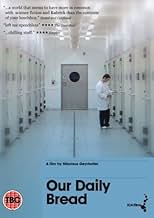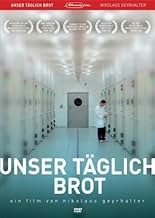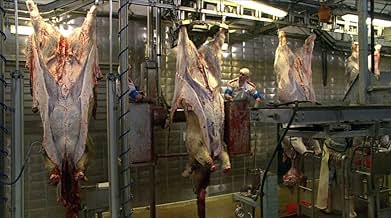IMDb RATING
7.5/10
2.7K
YOUR RATING
OUR DAILY BREAD is a wide-screen tableau of a feast which isn't always easy to digest - and in which we all take part. A pure, meticulous and high-end film experience that enables the audien... Read allOUR DAILY BREAD is a wide-screen tableau of a feast which isn't always easy to digest - and in which we all take part. A pure, meticulous and high-end film experience that enables the audience to form their own ideas.OUR DAILY BREAD is a wide-screen tableau of a feast which isn't always easy to digest - and in which we all take part. A pure, meticulous and high-end film experience that enables the audience to form their own ideas.
- Director
- Writers
- Stars
- Awards
- 4 wins & 5 nominations total
- Director
- Writers
- All cast & crew
- Production, box office & more at IMDbPro
Featured reviews
Don't watch this movie if you have bad stomach or you won't be able to eat for a while. It shows quite a bit of shocking footage of modern food processing facilities. Dehumanization of food processing is well shown by creative camera placement. Camera placement resembles Kubrick's in some scenes - scenes of machines and people moving through corridors. Some of machines and procedures shown in the movie are really shocking. Movie doesn't have any narration, only sounds that you hear are sounds of the environment. A bit of well picked music would make this movie even better. If you want to know how the food you eat comes to your table this is the movie to watch.
The recent film "Fast Food Nation" imposes a fictional narrative onto the factual expose of Eric Schlosser's informative and horrifying book about (among other things) the industrialization of agriculture. The documentary "Our Daily Bread" makes no such concession to its audience's need for story, presenting virtually wordlessly scene after scene of modern food production in action.
It's a cliché at this point to note how modern consumers are alienated from their diets, making no connection between the plastic-wrapped pieces of muscle they purchase in the supermarket and the animals they were once part of. Still, Austrian director Nikolaus Geyrhalter presents dozens of memorable and fascinating images, not all of them of the gross-out variety. In fact, there's even an abstract beauty to some of what we see, at least until we realize it's all part of a vast killing machine.
Difficult to sit through, "Our Daily Bread" is nonetheless an important record, invaluable for those with the courage to watch it.
It's a cliché at this point to note how modern consumers are alienated from their diets, making no connection between the plastic-wrapped pieces of muscle they purchase in the supermarket and the animals they were once part of. Still, Austrian director Nikolaus Geyrhalter presents dozens of memorable and fascinating images, not all of them of the gross-out variety. In fact, there's even an abstract beauty to some of what we see, at least until we realize it's all part of a vast killing machine.
Difficult to sit through, "Our Daily Bread" is nonetheless an important record, invaluable for those with the courage to watch it.
This movie didn't show me anything I didn't already know, but it's silence gave me time to think about what is shown. Certainly not a movie for impatient people or after a hard day at work. It left me with a strong feeling: That industrial farming and breeding is just that - industrial. Certainly the slaughterhouse sequences touched me most. Treatment of the animals doesn't appear cruel, but very unnatural. Efficiency and detachment rule. Plants and animals don't grow and live anymore. They are produced and harvested. What's ultimately lost is the variety of life outside the human production-sphere and the human connection to the world.
I'm always a sucker for films that try to emulate Baraka or Koyaanisqatsi. Non narrative films that let the images speak for themselves. A lot of films try and fail. Sometimes the images are too boring, sometimes it's too repetitive. 'Our Daily Bread' just about nearly gets it right by exploring how the food on our table comes to be. By going all over the world, and exploring all sorts of food, the filmmakers cover a spectacular realm of food, animals, and people for the documentary. Much is spectacular. What I found, and maybe I'm just a sicko, who knows, but I found the segments regarding how animals are processed to be the most fascinating. They almost completely copied the chick harvesting from Baraka (and who could blame them!) to the, I'm sorry, totally cool way they kill pigs nowadays. FUN FOR EVERYONE! Ha ha! I loved it!
This might be a film aliens exploring the human food system would produce. There is no dialogue, no explanations. Everything you see is repeated ten times. There is no particular order to what you see. There is no gross animal cruelty, just a clean, clinical, efficient Germanic lack of concern for animal welfare.
The silence and monotony gives a creepy feel about even things you might not normally consider sinister, like mining fertiliser. The sheer scale made me nauseous. The flow of pig, cow and chicken carcases goes on forever without pause. The hypnotic repetition creates a horrible inevitability.
Scenes that stick out: banks of chickens like inmates "heckling" two "guards" who walk down between the rows.
A cow that knows it is about to be killed and puts up a valiant attempt to escape.
A machine for vacuuming up chickens.
A Rube Goldberg contraption for gutting fish.
A man whose job is to mount fish on a sort of hobbyhorse to prepare them for further mechanised treatment. Hour after after he performs the same little grab and twist movement.
Men picking cabbages mounting in a frame that drives them at management's rate.
African immigrants without the money to buy the vegetables they grow in a greenhouse.
Casual calm castration, debeaking, slaughter and interfering with reproduction.
We humans have a sort of compact with domestic animals. We protect them from predators, we ensure they have food, we protect their health. In return they give us milk and meat. I think we are obligated to give them lives free from cruelty, reasonably close to life in the wild. But we have reneged. We care not a whit for their well being. Everything is for human convenience. We cheated. We ripped them off.
The silence and monotony gives a creepy feel about even things you might not normally consider sinister, like mining fertiliser. The sheer scale made me nauseous. The flow of pig, cow and chicken carcases goes on forever without pause. The hypnotic repetition creates a horrible inevitability.
Scenes that stick out: banks of chickens like inmates "heckling" two "guards" who walk down between the rows.
A cow that knows it is about to be killed and puts up a valiant attempt to escape.
A machine for vacuuming up chickens.
A Rube Goldberg contraption for gutting fish.
A man whose job is to mount fish on a sort of hobbyhorse to prepare them for further mechanised treatment. Hour after after he performs the same little grab and twist movement.
Men picking cabbages mounting in a frame that drives them at management's rate.
African immigrants without the money to buy the vegetables they grow in a greenhouse.
Casual calm castration, debeaking, slaughter and interfering with reproduction.
We humans have a sort of compact with domestic animals. We protect them from predators, we ensure they have food, we protect their health. In return they give us milk and meat. I think we are obligated to give them lives free from cruelty, reasonably close to life in the wild. But we have reneged. We care not a whit for their well being. Everything is for human convenience. We cheated. We ripped them off.
Did you know
- ConnectionsReferenced in Film Junk Podcast: Episode 232: Inglourious Basterds (2009)
Details
Box office
- Gross worldwide
- $71,810
- Runtime
- 1h 32m(92 min)
- Color
- Sound mix
- Aspect ratio
- 1.85 : 1
Contribute to this page
Suggest an edit or add missing content








